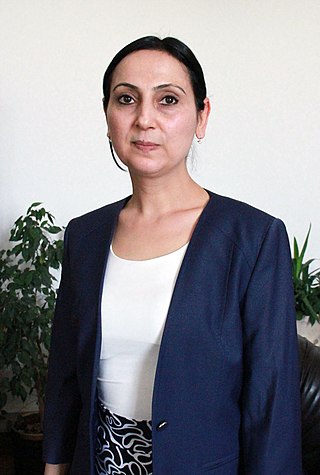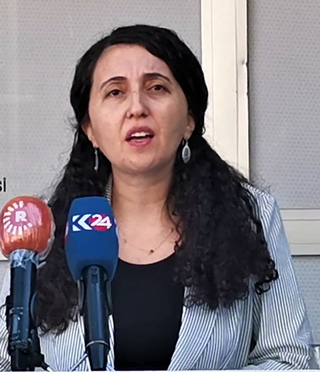Related Research Articles
Kurds have had a long history of discrimination perpetrated against them by the Turkish government. Massacres have periodically occurred against the Kurds since the establishment of the Republic of Turkey in 1923. Among the most significant is the massacre that happened during the Dersim rebellion, when 13,160 civilians were killed by the Turkish Army and 11,818 people were sent into exile. According to McDowall, 40,000 people were killed. The Zilan massacre of 1930 was a massacre of Kurdish residents of Turkey during the Ararat rebellion, in which 5,000 to 47,000 were killed.
The Maraş massacre was the massacre of more than one hundred leftists and Alevi Kurds in the city of Kahramanmaraş, Turkey, in December 1978, primarily by the neo-fascist Grey Wolves.

Ahmet Türk is a Turkish politician of Kurdish origin from the Peoples' Democratic Party (HDP). He has been a member of the Grand National Assembly of Turkey for several terms and was elected twice as the Mayor of Mardin. He was born into a family of Kurdish clan and tribal chiefs in southeastern Turkey.
The 2011–2012 Kurdish protests in Turkey were protests in Turkey, led by the Peace and Democracy Party (BDP), against restrictions of Kurdish rights by of the country's Kurdish minority's rights. Although they were the latest in a long series of protest actions by Kurds in Turkey, they were strongly influenced by the concurrent popular protests throughout the Middle East and North Africa, and the Turkish publication Hürriyet Daily News has suggested that the popularly dubbed "Arab Spring" that has seen revolutions in Egypt and Tunisia may lead to a "Kurdish Summer" in the northern reaches of the Middle East. Protesters have taken to the streets both in Istanbul and in southeast Turkey, with some demonstrations also reported as far west in Anatolia as İzmir.

The Roboski Incident, also known as the Uludere airstrike, took place on December 28, 2011, at Ortasu, Uludere near the Iraq-Turkey border, when the Turkish Air Force bombed a group of Kurdish civilians who had been involved in smuggling gasoline and cigarettes, killing 34. According to a statement of the Turkish Air Force the group were mistakenly thought to be members of the Kurdistan Workers' Party (PKK).

The 2014 Kobanî protests in Turkey were large-scale rallies by pro-People's Defense Units (YPG) protestors in Turkey which occurred in autumn 2014, as a spillover of the crisis in Kobanî. Large demonstrations unfolded in Turkey, and quickly descended into violence between protesters and the Turkish police. Several military incidents between Turkish forces and militants of the Youth Wing of the Kurdistan Workers' Party (PKK) in south-eastern Turkey contributed to the escalation. Protests then spread to various cities in Turkey. Protesters were met with tear gas and water cannons, and initially 12 people were killed. A total of 31 people were killed in subsequent protesting up to 14 October.

Figen Yüksekdağ Şenoğlu is a Turkish politician and journalist, who was a former co-leader of the left-wing Peoples' Democratic Party (HDP) of Turkey from 2014 to 2017, serving alongside Selahattin Demirtaş. She was a Member of Parliament for Van since the June 2015 general election until her parliamentary membership was revoked by the courts on 21 February 2017. Her party membership and therefore her co-leadership position were revoked by the courts on 9 March 2017 following a six-year prison sentence for distributing "terrorist propaganda".

Adnan Selçuk Mızraklı is a Kurdish politician of the Peoples' Democratic Party (HDP) and former member of the Grand National Assembly of Turkey and Mayor of Diyarbakir.

Ferhat Encü is a Kurdish–Turkish politician and former member of the Turkish Parliament in the Sirnak Province. Encü is well known for a speech that he gave on the floor of the Parliament in Ankara. In his speech, Encü criticized the Turkish government for their violence and mistreatment of the Kurds. After delivering the speech, Encü was arrested and stripped of his parliamentary immunity.

The 1991 Altun Kupri massacre occurred on 28 March 1991 in the Turkmen town of Altun Kupri, Kirkuk Governorate, Iraq. The massacre targeted Turkmens, in particular males, both children and adults alike, and was organized by security forces affiliated with Saddam Hussein's army. It came as a result of curbing the 1991 uprising in the dissident areas in the north and south of the country.

Abdurrahman Gök is a journalist and the author of the photographs which documented the murder of Kemal Kurkut.

Ebru Günay is a Kurdish jurist and a politician of the Peoples' Democratic Party (HDP). She was elected a member of the Grand National Assembly of Turkey in 2018 and is currently the spokeswoman of the HDP.
The Kurdistan Workers' Party (PKK) announced a ceasefire on the 13 April 2009, declaring they would only retaliate in self-defense. The ceasefire was encouraged by the electoral success of the Democratic Society Party (DTP) in the municipal elections of 2009. Then in May 2009, the president of the Kurdistan Communities Union (KCK) Murat Karayilan released a statement supportive of an eventual peace process. Later, the PKK prolonged the ceasefire on the 1 June until the 15 July 2009. On the 15 July the DTP organized a manifestation in support of a peace process which was attended by tens of thousands of people in Diyarbakir, and the PKK again prolonged their ceasefire until the 1 September 2009. The Human Rights Association (IHD), Freedom and Solidarity Party and the Labour Party also supported a potential peace process.
The Peoples' Democratic Party closure case refers to a legal procedure during which the Peoples' Democratic Party (HDP) is threatened with closure while hundreds of its politicians face a political ban for five years. The HDP was accused to have organizational ties with the Kurdistan Workers' Party (PKK).
On the 17 June 2021, Deniz Poyraz, a 38-year-old member of the Peoples' Democratic Party (HDP) was killed in the provincial seat of the party in Konak, Izmir which was under police surveillance. In December 2022, the murderer was sentenced to an aggravated life imprisonment.

Tülay Hatimoğulları Oruç is a Turkish linguistics rights activist and politician. She is the Co-Chair of the Peoples' Equality and Democracy Party and a member of the Grand National Assembly of Turkey.
The persecution of Kurds is the ethnic and political persecution which is inflicted upon Kurds by the governments of Iran, Syria, Turkey, and Iraq.

Hasip Kaplan a Turkish politician of Kurdish origin and former member of the Grand National Assembly of Turkey for several parties, in 2015 he represented the Peoples Democratic Party (HDP) in the Turkish Parliament.
Alican Önlü is a politician of the Peoples Democratic Party (HDP) and a member of the Grand National Assembly of Turkey. Throughout his political career he was a politician in a variety of parties such as the Democracy Party (DEP) and the Democratic Society Party (DTP).
References
- 1 2 "Video von rassistischem Angriff in Konya aufgetaucht". Firat News Agency (in German). Archived from the original on 2021-07-31. Retrieved 2021-08-02.
- 1 2 3 4 "Konya massacre: 'Turkey must confront racist hatred'". Bianet . 2 August 2021. Archived from the original on 2021-08-02. Retrieved 2 August 2021.
- 1 2 "Angriff auf kurdische Familie in Konya: Sieben Tote - UPDATE". Firat News Agency (in German). 2 August 2021. Archived from the original on 2021-07-30. Retrieved 2021-08-02.
- 1 2 Tuncel, Ruken (6 August 2021). "Konya massacre: The assailant might have been acting on behalf of other people, says attorney". Bianet . Archived from the original on 2021-08-06. Retrieved 7 August 2021.
- 1 2 "Turkish ultranationalists attack Kurdish neighbors in Turkey's Konya". Gazete Duvar . 2021-12-07. Archived from the original on 2021-07-12. Retrieved 2021-08-02.
- 1 2 Burç, Rosa (6 August 2021). "Wie die Waldbrände in der Türkei antikurdischen Rassismus befeuern". Die Zeit . Archived from the original on 2021-08-07. Retrieved 2021-08-07.
- ↑ "Seven Kurds killed in 'racist' attack in Turkey". The Guardian . 2021-07-30. Archived from the original on 2021-07-31. Retrieved 2021-08-07.
- 1 2 3 "Racist attack in Konya: Murder suspect caught 6 days later". Bianet . 4 August 2021. Archived from the original on 2021-08-04. Retrieved 5 August 2021.
- ↑ "Massacre in Konya: Murder suspect Altun arrested". Bianet . 6 August 2021. Retrieved 30 November 2021.
- ↑ "Investigation against journalist who covered massacre of Kurdish family in Konya". Bianet . 2 September 2021. Archived from the original on 2021-09-02. Retrieved 29 November 2021.
- ↑ "Freedom of Expression and the Press in Turkey - 309 - Expression Interrupted". www.expressioninterrupted.com. Retrieved 2021-11-30.
- ↑ "Warum die 7 Toten in Konya? Rassismus gegen Kurden oder Familienstreit". euronews (in German). 2021-07-31. Archived from the original on 2021-07-31. Retrieved 2021-08-02.
- 1 2 "Turkish officials deny ethnic motive in murder of seven Kurds". Al Jazeera . Archived from the original on 2021-07-31. Retrieved 2021-08-02.
- 1 2 "10 Arrested in Turkey in Deaths of 7 from Kurdish Family". Voice of America . 31 July 2021. Archived from the original on 2021-08-01. Retrieved 2021-08-07.
- 1 2 "7 Kurds slain in Turkey; officials deny ethnic motive". Washington Post . ISSN 0190-8286. Archived from the original on 2021-07-31. Retrieved 2021-08-07.
- ↑ "CİK: Mazlum ve imanlı Kürtlerin yanında safa durma zamanı". ANF News.
- ↑ "Journalist covering murder of Kurdish family targeted by Turkish newspaper". www.rudaw.net. Archived from the original on 2021-08-05. Retrieved 2021-08-28.
- ↑ "Turkey: Journalist Berna Kişin deliberately targeted by a pro-government media outlet, CFWIJ condemn". The Coalition For Women In Journalism. Archived from the original on 2021-08-28. Retrieved 2021-08-28.